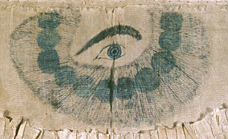Has any seen
The mighty chain of being, lessening down
From Infinite Perfection to the brink
Of dreary nothing, desolate abyss!
McNeal’s Prayer
In Egypt and India, since long before Old Testament times, this has been a symbol not of God himself, but of His omnipresence, and of His powers that are the most important to mankind: love, justice, and mercy. In modern Masonic ritual the All Seeing Eye is often combined with a sword pointing to a naked heart, to symbolize divine justice as well as the ever present Universal Intelligence. Learn more about Lewis’s practice as a freemason in Lewis as Master Mason.
True to the fresh new tenets of democracy, and consistent with the deistic premise that, as Jefferson confidently expressed it, the beliefs of individual men would “follow involuntarily the evidence proposed to their minds,” Lewis and Clark tacitly granted to the individuals who made up the Corps of Discovery the right to embrace their own spiritual convictions, and to honor their personal surrogates for divine providence.
One of the most frequently quoted passages in the journals is Lewis’s observation on 12 August 1805, regarding Private Hugh McNeal‘s spontaneous outburst of devotion. At “the most distant fountain of the waters of the mighty Missouri, . . . McNeal had exultingly stood with a foot on each side of this little rivulet and thanked his god [emphasis added] that he had lived to bestride the mighty & heretofore deemed endless Missouri.” As a Deist, Lewis may have thus underscored the principle of religious tolerance, and at the same time signified his concurrence with McNeal’s gesture.
Indian Spiritualism
Similarly, Lewis and Clark acknowledged the spiritualism of the Indian people they met. Clark defined the Lemhi Shoshones‘ concept of “great medicine” as “something that eminates from or acts immediately by the influence or power of the great sperit; or that in which the power of god is manifest by it’s incomprehensible power of action.” On the lower Columbia River on 6 April 1806, when the occupants of a particular Indian village were frightened by the white strangers, “an old man who was seting by continued to speak with great vehemence apparently imploring his god for protection.” Clark patiently reassured them. On the 28th of that month [28 April 1806], at the party Chief Yelleppit threw for the Corps, one of the Walla Wallas and Yakamas who took part, and who “made himself the most Conspicuous Character in the dance and Songs, we were told was a Medesene man & Could foretell things. that he had told of our Comeing into their Country and was now about the Consult his God the moon if what we Said was the truth &c. &c.” It may be, as some critics aver, that those observations are but condescending criticisms of Indian mores. However, they may instead reflect the captains’ genuine philanthropic respect for others’ modes of spirituality.
Recognizing Divine Providence
On a number of occasions Lewis seems to have acknowledged his own indebtedness to a higher power. It was providence that kept them safe from death beneath collapsing Missouri riverbanks; providence that buoyed them up in the face of dangers, frustrations, and hunger on their 51-day, 350-mile portage between navigable waters of the Missouri and the Columbia; providence that protected them when they crashed in a rapid as they paddled down the perilous Clearwater River; providence that sent them fresh whale blubber and oil to replenish their spirits and nourish their bodies in the middle of that grim winter at Fort Clatsop; providence that saved them again and again from the ferocity of those innumerable grizzly bears. True, every generation invents its own favorite, literally undefinable epithets, and this may have been merely an impious exclamation—Lewis’s mode of thanking his “lucky stars” or that “chapter of accidents” he occasionally called upon. On the other hand, as a proud Royal Arch Mason he was accustomed to honoring divine providence, or the Supreme Being, or the Universal Intelligence. In short, God.
Of all the journalists whose works have survived, Private Joseph Whitehouse is the one who came the closest to expressing an orthodox spiritual commitment. At Fort Clatsop on Christmas Day, 25 December 1805, he confided: “We had no ardent spirit of any kind among us”—they had finished off their supply of whiskey 174 days before—”but are mostly in good health, A blessing, which we esteem more, than all the luxuries this life can afford, and the party are all thankful to the Supreme Being, for his goodness towards us. —hoping he will preserve us in the same, & enable us to return to the United States again in safety.”
Did they pray? The answer is yes, they did—to invoke the catch-phrase their journalists sometimes used to generalize about the habits of others—”in their way.”
Experience the Lewis and Clark Trail
The Lewis and Clark Trail Experience—our sister site at lewisandclark.travel—connects the world to people and places on the Lewis and Clark Trail.
Discover More
- The Lewis and Clark Expedition: Day by Day by Gary E. Moulton (University of Nebraska Press, 2018). The story in prose, 14 May 1804–23 September 1806.
- The Lewis and Clark Journals: An American Epic of Discovery (abridged) by Gary E. Moulton (University of Nebraska Press, 2003). Selected journal excerpts, 14 May 1804–23 September 1806.
- The Lewis and Clark Journals. by Gary E. Moulton (University of Nebraska Press, 1983–2001). The complete story in 13 volumes.


